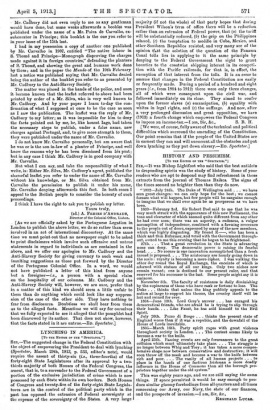LYNCHING IN AMERICA.
[To THE EDITOR OF THE " S7ECTATOR."] Sre.,—The suggested change in the Federal Constitution with the object of empowering the President to deal with lynching (Spectator, March 29th, 1913, p. 533, editor's note), would require the assent of thirty-six (i.e., three-fourths) of the forty-eight State Legislatures after its approval by a two- thirds majority of both Houses of the Federal Congress, the assent, that is, to a surrender to the Federal Government of a portion of the exclusive jurisdiction of crime which is now possessed by each State within its own borders. Both Houses of Congress and twenty-five of the forty-eight State Legisla- tures are in the control of the political party which in the past has opposed the extension of- Federal sovereignty at the expense of the sovereignty ofthe States. A very large majority (if not the whole) of that party hopes that during President Wilson's term of Office there will be a reduction rather than an extension of Federal power, that (a) the tariff will be substantially reduced, (b) the grip on the Philippines relaxed, (c) the temptation to meddle in Cuba, Mexico, and other Southern Republics resisted, and very many are of the opinion that the solution of the question of the Panama Canal tolls lies in applying to it the same principle by denying to the Federal Government the right to grant bounties to the coastwise shipping interest in its competi- tion with the Pacific railroads, for that is, in effect, the exemption of that interest from the tolls. It is an error to assume that changes in the Federal Constitution are easily or frequently made. During a period of a hundred and eight years (i.e., from 180t to 1912) there were only three changes, all of which were consequent upon the civil war, and followed immediately on its close. They aimed to confer upon the former slaves (a) emancipation, (b) equality with whites in legal rights, and (c) the suffrage. And now, after a very prolonged discussion and great opposition, we have (1913) a fourth change which empowers the Federal Congress to impose an income-tax.--I am, Sir, &c., S. R. H.
[We were, of course, fully aware of the technical and political difficulties which surround the amending of the Constitution. Our point remains that if the people of the United States are in earnest they can and will surmount all the obstacles and put down lynching as they put down slavery.—En. Spectator.]














































 Previous page
Previous page